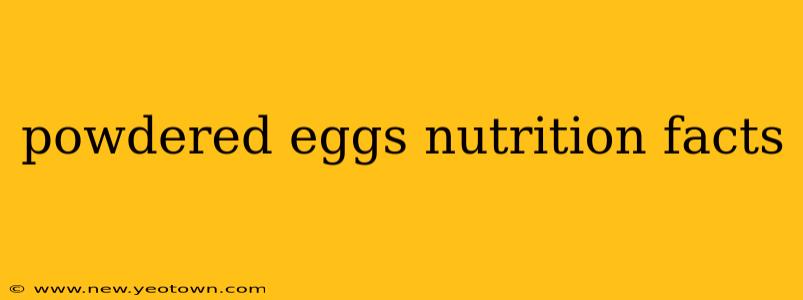Powdered eggs. The name conjures images of camping trips, emergency preparedness kits, and perhaps, slightly less-than-stellar baking results. But the truth is, powdered eggs have come a long way. They're a surprisingly versatile and nutritious ingredient, offering a convenient and shelf-stable alternative to fresh eggs. Let's crack open the facts and explore the nutritional powerhouse hidden within this humble powder.
My name is Anya Petrova, and I've spent years researching and writing about food science and nutrition. I'm passionate about helping people make informed choices about the food they consume, and I'm excited to share my knowledge with you today.
What are the Nutritional Benefits of Powdered Eggs?
One of the biggest advantages of powdered eggs is their impressive nutritional profile. They're packed with protein, essential for building and repairing tissues, and a good source of several vitamins and minerals. A single serving (typically around 1/4 cup reconstituted) often provides a significant chunk of your daily recommended intake of several essential nutrients. Think of them as concentrated egg-cellent goodness!
But the benefits go beyond the basic nutritional makeup. The convenience factor is undeniable. Powdered eggs boast an incredibly long shelf life—sometimes lasting for years if stored properly—making them perfect for emergencies, long trips, or simply reducing food waste by avoiding spoilage.
How Do Powdered Eggs Compare to Fresh Eggs?
This is a question many people have. The simple answer is: they're quite similar, though there are subtle differences. Powdered eggs are generally lower in some vitamins (like vitamin B12) and fatty acids than fresh eggs. The processing methods can also result in a slightly altered flavor and texture, though advances in manufacturing have vastly improved this in recent years. However, the overall nutritional value remains competitive. The convenience and extended shelf life often outweigh the minor nutritional discrepancies for many people.
Are There Different Types of Powdered Eggs?
Yes! You'll find two main types on the market: whole egg powder and egg white powder. Whole egg powder contains both the yolk and the white, offering a more complete nutritional profile. Egg white powder, on the other hand, is made solely from the egg whites, making it a lower-fat, lower-cholesterol option, ideal for those watching their weight or cholesterol levels. The choice depends on your specific dietary needs and culinary preferences.
What are the Potential Downsides of Powdered Eggs?
While generally safe and nutritious, powdered eggs do have some potential drawbacks. Some people find the flavor and texture slightly different from fresh eggs, especially in recipes requiring a delicate flavor profile. Also, be sure to check the storage instructions carefully as improper storage can lead to spoilage. Finally, the manufacturing process might sometimes lead to a slightly reduced level of certain nutrients compared to fresh eggs.
How are Powdered Eggs Made?
Powdered eggs are produced through a process of pasteurization, drying, and milling. Fresh eggs are first pasteurized to eliminate any harmful bacteria. Then, the eggs are carefully dried using spray drying or other methods, removing the moisture content. The resulting powder is then ground and packaged, ready for use.
Can Powdered Eggs Be Used in Baking?
Absolutely! While you might need to adjust your recipes slightly (some recipes call for adding a bit of extra liquid) powdered eggs can be successfully used in many baking applications. From cakes and cookies to pancakes and waffles, many bakers have discovered that the convenience and long shelf life of powdered eggs makes them a worthy addition to their baking arsenal. The resulting baked goods will have a slightly different texture and mouthfeel, though most often the difference is minimal.
What is the Shelf Life of Powdered Eggs?
The shelf life of powdered eggs varies depending on the brand and storage conditions. However, properly stored powdered eggs can remain safe and retain their quality for several months, sometimes even years. Always check the expiration date on the packaging and store them in a cool, dark, and dry place.
In conclusion, powdered eggs offer a convenient and surprisingly nutritious alternative to fresh eggs. While there are minor differences in flavor, texture, and nutrient content, the benefits of extended shelf life and versatility often outweigh these minor drawbacks for many consumers. Whether you're a seasoned baker, a seasoned camper, or simply looking for a shelf-stable food source, powdered eggs deserve a place in your pantry.

